
DECEMBER 2005
I have a question for the world
BBC excerpts
Imran Zia:
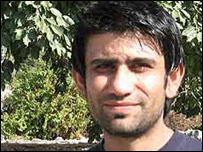
I have a question for the world. There is a lot of relief work here but it's slowing down. I get the sense that other countries are beginning to lose interest in us. Why is that? Is it because this is still not as big a death toll as the tsunami?
Rizwan Zia, 28, businessman:
I used to travel, enjoy seeing the world. Now I just want
to stay here. This is my world now, 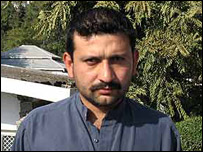 sitting here, looking
after my family, guarding what's left of our house. I
want whoever that's reading this to know - whether this
Muzaffarabad is rebuilt or not, we are never leaving
here. We will stay on now, whatever happens next. This is
our home.
sitting here, looking
after my family, guarding what's left of our house. I
want whoever that's reading this to know - whether this
Muzaffarabad is rebuilt or not, we are never leaving
here. We will stay on now, whatever happens next. This is
our home.
Imran Zia, 26:
Same here. I need go no further than Islamabad, only 140
km away, to find the noise and chaos gives me a headache.
I see people there living life as normal and I feel they
don't care what happened to us. Only I know this pain.
Pray for us, whoever you are reading this, give us motivation.
Mohammed Afzal Chauhan, businessman:
The earthquake was terrible. But it was God's will, not
the work of men. What is really terrible is what happened
after the earthquake - the looting, the plunder. A lot of
outsiders arrived to steal from us in our moment of
weakness. So much money and jewellery was taken away.
Truly, Pakistan is the last bastion of Islam and you see all types of behaviour here.
There was an old man from Lahore, which is thousands of miles away, who heard about the quake and put a load of blankets and food in his horse-cart and set off to help us. Imagine. All the way from Lahore in a cart!
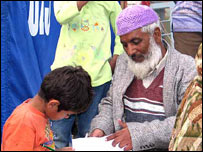 But just before he
could get here, highwaymen robbed him of everything .
But just before he
could get here, highwaymen robbed him of everything .
Child: Imran:We have learnt that nothing
material is permanent. What matters most are things you
can't see - like the bonds between people. Buildings
don't matter anymore, they all fall down. Making money,
getting a big house - what's the point? Just help people.
Live for others. That's what we've learnt.
| President Pervez Musharraf :UPDATE mid
November He called funds received so far from international donors "negligible" and said he hoped to raise the money needed at an Islamabad conference on Saturday. UN Secretary General Kofi Annan and the heads of international agencies and aid groups are expected to attend the meeting.............. He said the figure of $5.2bn was based on estimates by UN agencies, the World Bank, the Asian Development Bank. It included $3.5bn for reconstruction, $1.5bn for relief and $100m for rehabilitation, he told reporters in Islamabad. I have spoken to world leaders and their responses have been very positive," President Musharraf said. "If the world community does not come up, we will do something ourselves - our economy is strong enough." The UN has also accused countries of failing to back pledges with cash. The BBC's Zaffar Abbas in Islamabad says President Musharraf plans to encourage individual donors to directly sponsor or donate funds for the construction of a whole village or a school or hospital. But for housing, money and technical assistance would be provided to people to rebuild their houses according to their specific needs. Meanwhile, Pakistan says civilians will cross Kashmir's de facto border on Thursday as part of relief efforts. |
| Article >> http://euobserver.com/?aid=20308&rk=1 Update from Children Are the Future asbl & SUNGI following earthquake one month ago The children in the earthquake zone have had so much taken away. Most will have lost someone close, many will have been injured and all now face a struggle for survival. Winter is coming to the treacherous mountains where they live. The weather forecasts say rain and plunging temperatures are likely next week. Sometimes the figures say it all: nearly one million children (955,000) of school age have been affected by the disaster, over 450,000 children between 5 and 9 years of age require primary education, and an estimated 4,000 temporary primary schools are needed. It's now or never for these children: your financial support can make the difference between life or death! Hereby the details for donations to the SUNGI bank account in Belgium: Account number: 734-0162877-23 Account name: DUCHATEAU - GHANI BIC/SWIFT: KREDBEBB IBAN: BE92-734016287723 SUBJECT LINE: "SUNGI DEVELOPMENT FOUNDATION" Bank Address details: KBC Bank Marnix Avenue Marnix 31 B-1000 Brussels Belgium A detailed report of how SUNGI has been distributing the aid and funds received can be found on their website, at http://www.sungi.org/Disaster%20Humanitarian%20Response/Sungi's%20Humani http://www.sungi.org For further information please contact Anja Duchateau, Secretary General Children Are the Future asbl / vzw at +32/476/420.244, info@caf-europe.org |
Police clash with
quake survivors
Pakistani police have baton-charged
about 200 survivors of the 8 October quake who were
protesting at being evicted 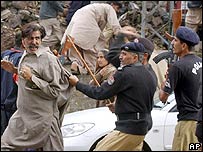 from a makeshift camp.
from a makeshift camp.
Police used canes to break up the march in the centre of Muzaffarabad in Pakistan-controlled Kashmir.
Police said the camp had inadequate sanitation but protesters said they had nowhere else to go.
In some areas winter weather is now setting in, increasing fears time is running out to bring aid and shelter.
Pakistan's official death toll for the quake is 73,000 although donors and aid agencies have placed the figure much higher.
Informal camps
A number of protesters were hurt in the demonstration in Muzaffarabad when about 50 police blocked their path.
Demonstrators reportedly threw rubble at police.
Police had ordered the camp, known as Jalalabad gardens, situated in a park near the city's destroyed library, to be closed.
"They were ordered to leave the
temporary camp because it was set up in the middle of the
city and it did not have any proper sanitation or waste
disposal facilities," police chief Shahid Hassan
told the AFP news agency. 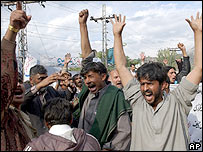
Additional deputy commissioner for Muzaffarabad, Atuallah Ata, said five people had been arrested on charges of violating a ban on gatherings of more than four people.
He told the BBC's Javed Soomro in Muzaffarabad that two policemen were wounded but he did not know of casualties among protesters.
Mr Ata said quake survivors should move to bigger tent villages that were more suitable for longer-term accommodation.
He hoped to find a peaceful solution but force would be used if necessary.
One demonstrator, Salim Shah, said he
had been beaten with batons.
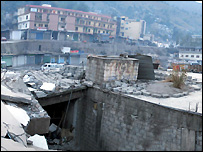
"They ordered us to leave the Jalalabad gardens. They said they would come with bulldozers, so we protested. We have no other place to go."
They say they are determined to stay put.
Winter winning
A number of informal camps have sprung
up since the quake, with poor  facilities.
facilities.
This week there have been a number of cases of acute diarrhoea.
Fears are also increasing for survivors in more remote regions as winter weather arrives.
The BBC's Chris Morris, who has flown into more isolated regions, says not enough aid has yet reached places high in the mountains where isolated communities are scattered across the ridges and down in the valleys.
Villagers travel to military bases for
aid from as far away as eight kilometres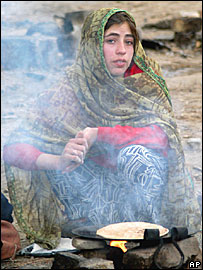 then
distribute the aid through to the villages.
then
distribute the aid through to the villages.
Our correspondent says helicopters will soon be unable to operated in the region.
Aid agencies say they are prioritising help to high-altitude communities.
However, UN coordinator Rashid Khalikov
admitted: "In the meantime, we do not have enough
resources to take care of those who are in the lowlands.
Their vulnerability also increases dramatically."
neelum valley
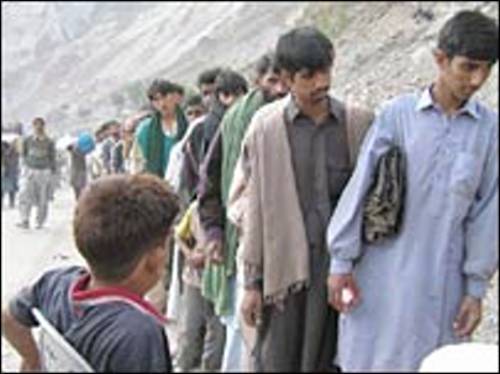
Neelum Valley is a 200-km (124m) gorge through
which flows River Neelum, or Kishanganga as it is known
in India.
The valley is among the worst-hit areas.
The road that winds along the river is so badly damaged - starting a bare two kilometres (1.2 miles) outside Muzaffarabad - that it has taken army engineers 14 days to repair a four-kilometre (2.5 miles) stretch.
They have another 196km (122 miles) to go.
An officer from the Army engineering corps, Irfanullah Khan, told the BBC News website that they came there thinking they would have to clear and repair the road.
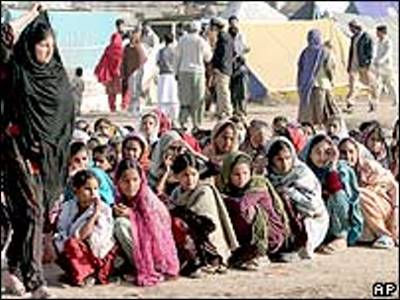 "Instead, what we have
discovered is that we may need to rebuild most of
it," he said.
"Instead, what we have
discovered is that we may need to rebuild most of
it," he said.
"Look what is happening here," he said pointing to the road ahead. The army had cleared a part of it - a bulldozer had pushed through - but a huge landslide again blocked the part it had cleared only hours earlier.
Unending landslides
For as far as the eye can follow this narrow, winding gorge, one can see mountains still crumbling on both sides.
The unending landslides have reduced entire mountain sides to slopes of gravel and dust - too dangerous to be traversed even on foot.